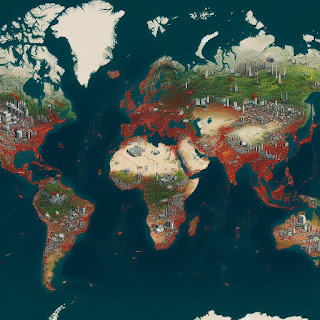As I've shared in past articles, I have been studying the impact of "scaling" on both history and our emerging future. I have been looking for common threads and patterns that potentially shed light on what has made scaling possible. Here are a few I am pondering today:
- Technological Innovation: At the core of most scaling endeavors is a technological breakthrough. From the invention of the plow in agriculture to cloud computing in the digital age, technology acts as a catalyst that enables scaling by improving efficiency and productivity.
- Standardization: The adoption of the alphabet and the creation of global supply chains both required standardization (think 40 foot shipping containers). Standardized processes, measurements, and systems enable replication and consistency, which are essential for scaling.
- Infrastructure Development: Robust infrastructure, such as Roman aqueducts and sewage systems, railroads, and telecommunication networks, supports the expansion of scale by facilitating the flow of goods, services, and information.
- Economic Systems: The development of financial institutions and corporate structures provided the framework necessary for scaling industries and managing large-scale economic activities efficiently.
- Sociopolitical Factors: The spread of major world religions and the impact of world wars demonstrate the role of governance, ideology, and organizational capability in scaling. These factors can direct resources, mobilize populations, and enforce systems that enable scaling.
- Globalization: Many forms of scaling were made possible due to the expansion of global interactions. Trade routes, maritime technologies, and later, aviation and the internet, all contributed to creating a globalized world where ideas, products, and innovations could scale rapidly.
- Human Capital Development: The proliferation of global education systems and the resultant improved literacy rates fostered a knowledgeable workforce capable of driving and sustaining scaling efforts.
- Regulatory Frameworks: As seen with the United Nations' formation, effective scaling often requires governance structures that can manage increased complexity and maintain standards across expanded domains.
- Ethical and Social Considerations: The negative aspects of scaling, such as labor conditions during the Industrial Revolution or the environmental impact of the oil industry, highlight that scaling often brings with it ethical and societal challenges that need addressing. Synthetic biology, artificial intelligence and climate change ensure these kinds of ethical challenges will continue into the future.
 |
| Scaling has Benefits |
I think it's important to pause a moment to celebrate how these human innovations and endeavors have improved our standard of living over time. Yes, these innovations have created numerous additional challenges (think environmental and climate), but without these developments life would have been even shorter, more violent and miserable for all.
*I use generative AI to assist in all my work.
************************************************************************
Kevin Benedict
Futurist at TCS
View my profile on LinkedIn
Follow me on Twitter @krbenedict
Join the Linkedin Group Digital Intelligence
***Full Disclosure: These are my personal opinions. No company is silly enough to claim them. I work with and have worked with many of the companies mentioned in my articles.





